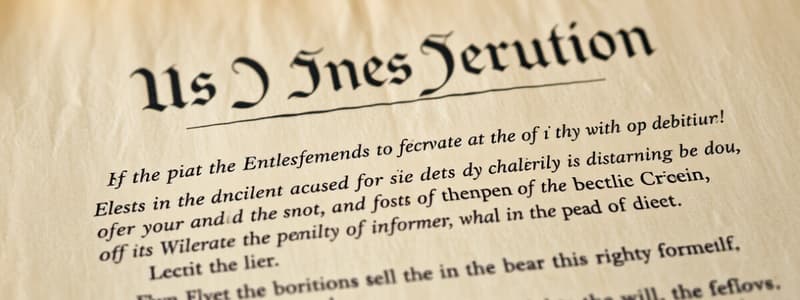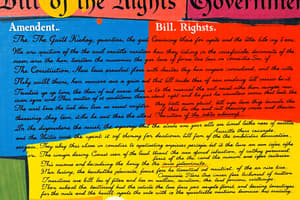Podcast
Questions and Answers
What does the 1st Amendment protect?
What does the 1st Amendment protect?
- Trial by jury
- Freedom of Religion (correct)
- Right to bear arms
- Excessive bail
What does the 2nd Amendment protect?
What does the 2nd Amendment protect?
- Freedom of speech
- Right to bear arms (correct)
- Right to vote
- Protection against unreasonable searches
What does the 3rd Amendment state about soldiers?
What does the 3rd Amendment state about soldiers?
No soldier can be quartered in a home without the permission of the owner.
What does the 4th Amendment prohibit?
What does the 4th Amendment prohibit?
What rights does the 5th Amendment protect?
What rights does the 5th Amendment protect?
What does the 6th Amendment guarantee?
What does the 6th Amendment guarantee?
What type of cases does the 7th Amendment apply to?
What type of cases does the 7th Amendment apply to?
What does the 8th Amendment prohibit?
What does the 8th Amendment prohibit?
What does the 9th Amendment state about rights?
What does the 9th Amendment state about rights?
What is the main focus of the 10th Amendment?
What is the main focus of the 10th Amendment?
What does the 11th Amendment address?
What does the 11th Amendment address?
What is required by the 12th Amendment during elections?
What is required by the 12th Amendment during elections?
What did the 13th Amendment achieve?
What did the 13th Amendment achieve?
What does the 14th Amendment guarantee?
What does the 14th Amendment guarantee?
What right did the 15th Amendment grant?
What right did the 15th Amendment grant?
What tax did the 16th Amendment create?
What tax did the 16th Amendment create?
What process does the 17th Amendment introduce?
What process does the 17th Amendment introduce?
What does the 18th Amendment prohibit?
What does the 18th Amendment prohibit?
What right was granted by the 19th Amendment?
What right was granted by the 19th Amendment?
What does the 20th Amendment address?
What does the 20th Amendment address?
What did the 21st Amendment achieve?
What did the 21st Amendment achieve?
What limitation does the 22nd Amendment impose?
What limitation does the 22nd Amendment impose?
What does the 23rd Amendment do for Washington, D.C.?
What does the 23rd Amendment do for Washington, D.C.?
What does the 24th Amendment prohibit?
What does the 24th Amendment prohibit?
What succession does the 25th Amendment explain?
What succession does the 25th Amendment explain?
What voting age is set by the 26th Amendment?
What voting age is set by the 26th Amendment?
What does the 27th Amendment state about Congressional salaries?
What does the 27th Amendment state about Congressional salaries?
Flashcards are hidden until you start studying
Study Notes
1st Amendment
- Guarantees freedoms concerning religion, speech, press, assembly, and petition.
- Vital for protecting individual rights and promoting democratic principles.
2nd Amendment
- Affirms the right of individuals to bear arms for self-defense.
- Centered around the concept of a well-regulated militia.
3rd Amendment
- Prohibits the quartering of soldiers in private homes without consent.
- Reflects the historical context of the American Revolutionary War.
4th Amendment
- Guards against unreasonable searches and seizures.
- Establishes the necessity of probable cause for issuing search warrants.
5th Amendment
- Protects against self-incrimination and double jeopardy.
- Ensures due process of law is followed in legal proceedings.
6th Amendment
- Guarantees the right to a speedy and public trial by an impartial jury.
- Includes rights to confront witnesses and receive legal counsel.
7th Amendment
- Preserves the right to a jury trial in civil cases where the value exceeds $20.
- Highlights the importance of jury trials in protecting legal rights.
8th Amendment
- Prohibits excessive bail and fines, along with cruel and unusual punishment.
- Vital for maintaining humane treatment within the justice system.
9th Amendment
- Affirms that individuals have rights beyond those explicitly listed in the Constitution.
- Acknowledges the existence of unenumerated rights.
10th Amendment
- Emphasizes that powers not granted to the federal government are reserved for states or the people.
- Underlines the principle of federalism in the American political system.
11th Amendment
- Establishes limits on lawsuits against states by individuals from other states or foreign entities.
- Aims to protect state sovereignty in the judicial system.
12th Amendment
- Specifies the procedures for the Electoral College to elect the President and Vice President separately.
- Aims to prevent complications in the election process.
13th Amendment
- Abolishes slavery and involuntary servitude in the United States.
- A significant milestone in the civil rights movement.
14th Amendment
- Grants citizenship to all persons born on U.S. soil and ensures equal protection under the law.
- Fundamental in advancing civil rights and liberties.
15th Amendment
- Ensures that the right to vote cannot be denied based on race, color, or previous condition of servitude.
- Important for expanding suffrage and combatting racial discrimination.
16th Amendment
- Authorizes the federal government to impose income taxes.
- Revolutionized government funding mechanisms.
17th Amendment
- Mandates the direct election of U.S. Senators by voters.
- Strengthened democratic participation in government.
18th Amendment
- Enacted Prohibition, banning the manufacture, sale, and transportation of alcohol.
- Reflects social reform movements of the early 20th century.
19th Amendment
- Grants women the right to vote, advancing gender equality in the political sphere.
- Marks a key victory in the women's suffrage movement.
20th Amendment
- Modifies the terms of office for Congress and the President to reduce the "lame duck" period.
- Aims for more efficient government function post-elections.
21st Amendment
- Repeals the 18th Amendment, ending Prohibition.
- Reflects changing societal attitudes toward alcohol consumption.
22nd Amendment
- Limits the President to two elected terms in office, or a maximum of ten years.
- Ensures the rotation of political leadership.
23rd Amendment
- Grants Washington, D.C. electoral votes in the Presidential elections.
- Ensures representation for D.C. residents in national politics.
24th Amendment
- Abolishes poll taxes in federal elections.
- Removes financial barriers to voting, promoting accessibility.
25th Amendment
- Outlines presidential succession and procedures for filling a vacancy.
- Addresses scenarios of presidential incapacitation.
26th Amendment
- Sets the national voting age at 18 years, prohibiting higher age limits.
- Reflects a commitment to youth engagement in the democratic process.
27th Amendment
- States that changes to Congressional salaries take effect only after the next election.
- Designed to prevent conflicts of interest regarding salary increases.
Studying That Suits You
Use AI to generate personalized quizzes and flashcards to suit your learning preferences.




